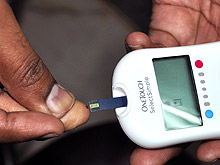
A new study suggests that the problems controlling blood sugar - the characteristic of diabetes - may begin in the intestines.
The finding may stir the long-held theories about the causes of the disease. As production of insulin takes place in the pancreas and sugar get stored in the liver, many scientists have looked to those organs for the primary causes of diabetes.
For this new research, scientists at Washington University School of Medicine in St. Louis conducted this study on mice that are unable to make fatty acid synthase (FAS) in the intestine.
FAS, an enzyme important for the production of lipids, is regulated by insulin, and diabetics have defects in FAS. They found that mice without the enzyme in the intestines develop chronic inflammation in the gut that is an important indicator of the diabetes.
"Diabetes may indeed start in your gut," said Clay F. Semenkovich, MD lead investigator.
"When people become resistant to insulin, as happens when they gain weight, FAS doesn't work properly, which causes inflammation that, in turn, can lead to diabetes,” said Semenkovich.
First author Xiaochao Wei, PhD, and Semenkovich, the Herbert S. Gasser Professor of Medicine, professor of cell biology and physiology and director of the Division of Endocrinology, Metabolism and Lipid Research, collaborated with specialists in gastroenterology and genome sciences to determine reasons behind non formation of FAS in the intestines of mice.
"The first striking thing we saw was that the mice began losing weight. They had diarrhea and other gastrointestinal symptoms, and when we looked closely at the tissue in the gut, we found a lot of inflammation," Wei, a research instructor in medicine has been quoted as saying.
Wei stated that the mice got sick due to a defect in fatty acid synthase. The mice without fatty acid synthase had lost the defensive lining of mucus in the intestines that checks the microbes from coming in contact with cells. This allowed bacteria to penetrate otherwise healthy cells in the gut, making the mice sick.
The researchers further collaborated with Nicholas O. Davidson, MD, director of the Division of Gastroenterology. In this study researchers found gastrointestinal effects that were similar to features of inflammatory bowel disease. Other investigators studying humans with ulcerative colitis had observation that colon biopsies from these patients have small quantities of fatty acid synthase.
"Fatty acid synthase is required to keep that mucosal layer intact. Without it, bad bacteria invade cells in the colon and the small intestine, creating inflammation, and that, in turn, contributes to insulin resistance and diabetes," Wei said.
Inflammation and insulin resistance strengthen each other. Inflammatory substances show resistance to insulin and check the production of insulin, both of which interfere with the control of blood sugar. In turn, insulin resistance is known to encourage inflammation.
The study further reveals that the ability to build the thin, but important, layer of mucosal cells was stalled by faulty FAS.
The study also marks the importance of gut in the development of diabetes. Because many people with the condition not only have faulty FAS, but they also often develop gastrointestinal difficulties, Semenkovich added.
"Abdominal pain and diarrhea are some of the most common problems we see in people with diabetes. We could only connect these 'dots' because other experts at the university could help us link what we observed in these mice to what occurs in patients with diabetes and inflammatory bowel disease," he added.
Semenkovich and Wei opined that more study is required on this subject. They also said that FAS and a key component of the intestinal mucosa called Muc2 could be potential targets for treatment of diabetes. They want to study people with diabetes to find out whether FAS is changed in a similar way, making damage to the mucosal layer in the intestines.
Cell Host and Microbe, a journal has published these findings.
--With inputs from ANI
|
|
Read More: Ag School | H E School Po | C E School Po | R.k.university Dso | H.m.p. School | Bhonsala Military School | Police Training School | Barnes High School | School Of Artillery So | Lic Division | S.v.university So | Bijapur Sainik School | Kittur Channamma School | Ponniah School Buildings | Cherambadi Tea Division | Sainik School | Suri Dist. School Boardndtso | District School Board | School Para | School Dhura


Comments: